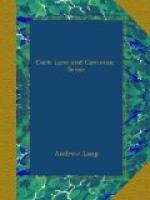Is a divine being compelled, Porphyry asks, to aid in these efforts, or is it only the soul of the seer, as some believe, which hallucinates itself, by the aid of points de repere? {70b} Or is there a blending of the soul’s operations with the divine inspiration? Or are demons in some way evolved out of something abstracted from living bodies? He seems to hint at some such theory of ‘exuvious fumes’ from the ‘circle,’ as more recent inquirers have imagined. The young appear to be peculiarly sensitive to vapours, invocations, and other magical methods, which affect the human constitution, and the young are usually engaged as seers. Hence visions are probably subjective. Ecstasy, madness, fasts and vigils seem particularly favourable to divination. Or are there certain mystic correspondences in the nature of things, which may be detected? Thus stones and herbs are used in evocations; ’sacred bonds’ are tied (as in the Eskimo hypnotism and in Australia); closed doors are opened, the heavenly bodies are observed. Some suppose that there is a race of false and counterfeiting spirits, which, indeed, Iamblichus admits. These act the parts of gods, demons, and souls of the dead. Again, the conjurer plays on our expectant attention. Omitting some remarks no longer appropriate, Porphyry asks what use there is in chanting barbarous and meaningless words. He is inclined to think that the demon, or guardian spirit of each man is only part of his soul,—in fact his ‘subliminal self’. And generally, he suspects that the whole affair is ‘a mere imaginative deceit, played off on itself by the soul’.
Replying as to divination, Iamblichus says that the right kind of dreams are between sleeping and waking when we hear a voice giving directions. A modern example occurred in the trial of the Assynt murderer in 1831. One Kenneth Fraser, called ‘the dreamer,’ said in the trial: ’I was at home when I had the dream. It was said to me in my sleep by a voice like a man’s voice, that the pack (of the murdered pedlar) was lying in sight of the place. I got a sight of the place just as if I had been awake. I never saw the place before, but the voice said in Gaelic, “the pack of the merchant is lying in a cairn of stones, in a hollow near to their house”. The voice did not name Macleod’s house.’ The pack was, however, not found there, but in a place hard by, which Kenneth had not seen in his dream. Oddly enough, the murderer had originally hidden the pack, or some of its contents, in a cairn of stones, but later removed it. In the ‘willing game,’ as played by Mr. Stuart Cumberland, the seeker usually goes first to the place where the hider had thought of concealing the object, though later he changed his mind. Macleod was hanged, he confessed his guilt. {71}




